Keto Backpacking: How to Eat Keto Smart
By Davi Reid & Aaron Owens Mayhew, MS, RDN, CD
Updated January 14, 2024
This post may contain affiliate links.
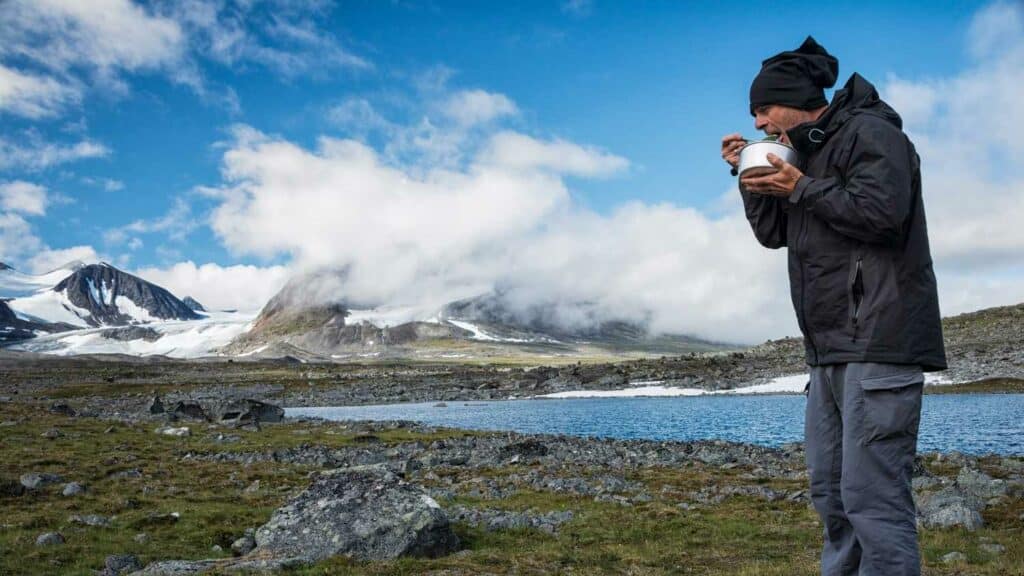
Okay, so if you’re here, you’re likely curious about keto backpacking. Maybe you’ve already begun your keto journey. Whether you’re an experienced ketovore or just getting started, there are 3 key ways to eat keto smart while keto backpacking. Let’s first start with…
What is Keto Backpacking?
Keto backpacking means backpacking while following the keto diet. The keto diet (also known as the ketogenic or ketovore diet) consists of high-fat, low-carbohydrate meals, snacks, and beverages. This diet encourages your body to make ketones from fat. Ketones are then used as fuel. To be keto fueled, you generally shouldn’t eat more than 50 grams of carbohydrates daily. 75-90% of total daily calories come from fat.
Is Keto Backpacking Healthy?
Scientists still have a lot of research to do when it comes to the keto diet. But one thing is for sure: many backpackers are trying it out. Our focus here at Backcountry Foodie is to support keto backpackers in staying fueled as safely as possible. So, we will go over potential problems that you might run into on the keto diet and how to avoid them. After reading about of top 3 keto diet tips, be sure to check out our Keto Hiking Performance post.
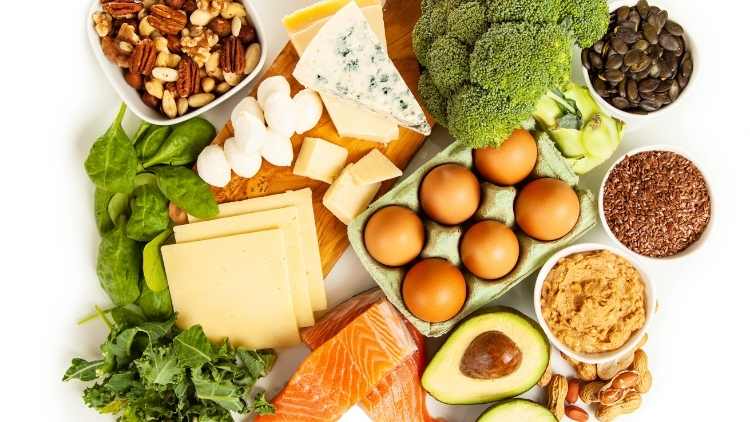
Foods Included in the Keto Diet
- Meats
- Fatty fish
- Poultry
- Low-carb dairy
- Low-carb veggies
- Nuts, seeds
- Avocado
- Coconut products
- Oils – olive, coconut, MCT, avocado
- Butter
As you can see, the keto diet eliminates many foods from plant sources, such as fruit, grains, beans, and lentils, to name a few. Because of this, the diet is sometimes low in certain nutrients. Keep reading to learn more about potential vitamin and mineral deficiencies as a keto backpacker.
Disclosure: This article is not intended to be medical advice; purely informational. It should not be used as a substitute for your primary care physician's recommendations.
Now, let’s start with our keto backpacking deep dive and how to eat keto smart.

Keto Backpacking: Eating Keto Smart – Tip #1
Don’t Let Vitamin & Mineral Deficiencies Slow You Down
Ketogenic backpacking meals can be great for meeting your energy demands on the trail. However, besides eating adequate calories, remember that your body also needs vitamins and minerals while backpacking. Due to the diet’s restrictive nature, keto foods can be high in fat-soluble vitamins (vitamins E, D, and K) but low in water-soluble ones (B vitamins and vitamin C). Not getting enough of these vitamins for an extended period can cause nutritional deficiencies, resulting in fatigue and an early end to your trek. If you’re following a ketovore diet for a long time (for example, a 5-month thru-hike), you might find our post 5 possible nutrient deficiencies when backpacking an eye-opening read.
Did you know that up to 50% of vitamins are lost during food dehydration?
Many keto backpackers rely on dehydrated meals while in the backcountry. Unfortunately, the process of dehydrating food can decrease its nutritional content. This is due to the extended heat exposure food undergoes during the dehydration process. Also, blanching before dehydration causes losses in the B-complex vitamins and vitamin C. Up to 50% of these vitamins can be lost in typical dehydrated foods. Remember that ketogenic diet foods are typically low in water-soluble vitamins anyway. Therefore, dehydrated keto backpacking meals have even fewer of these important nutrients than traditional backpacking meals. Ketovore backpackers should be aware of the following signs of vitamin deficiencies.
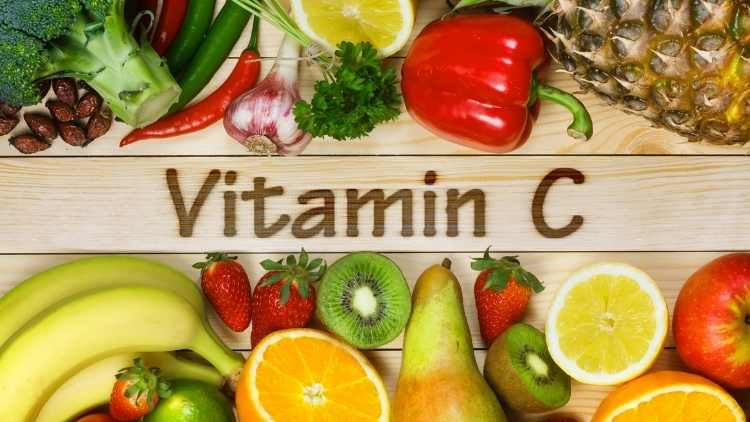
Vitamin C Deficiency
- Delayed wound healing
- Bleeding gums
- Fatigue
- Dry skin
- Irritability
- Brittle hair
Backpacking Foods High in Vitamin C
- Red peppers (freeze-dried)
- Citrus fruits (oranges, grapefruit, lemons – whole, juice packets)
- Broccoli (freeze-dried)
- Strawberries (freeze-dried)
- Tomatoes (freeze-dried)
- Spinach (freeze-dried)
- Green peas (freeze-dried)
- Green pepper (freeze-dried)
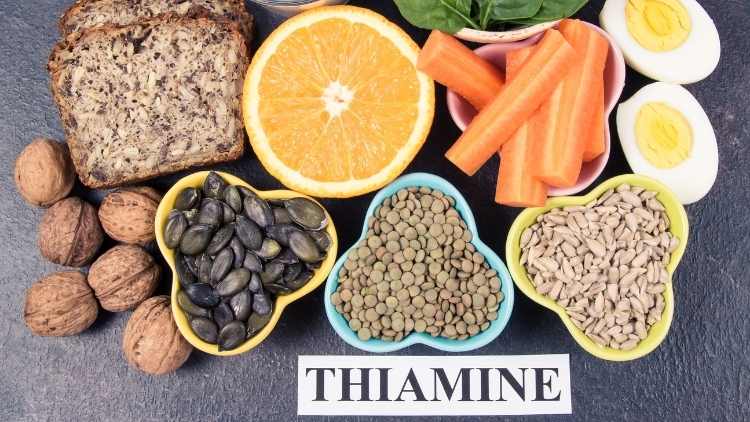
Thiamin/ Thiamine/ B1 Deficiency
- Loss of appetite
- Irritability
- Short-term memory problems
- Chest pain
- Swelling of the extremities
- Loss of feeling in the hands and feet
- Double vision
- Memory loss
- Confusion
- Vertigo
Backpacking Foods High in Thiamine
- Instant brown rice
- Sunflower seeds
- Beef (freeze-dried, dehydrated)
- Yogurt (freeze-dried)
- Oatmeal
- Corn (freeze-dried, dehydrated)
How to Avoid Vitamin and Mineral Deficiencies while Keto Backpacking
Because ketogenic backpacking meals can be low in vitamins and minerals, consider taking a complete multivitamin and mineral supplement if you want to go keto for an extended period. Whether you are backpacking or not, a multivitamin with 100% of most vitamins and minerals is a good safety net for just about anyone on a restrictive diet. (We recognize that being keto-fueled means you are eating this way as a lifestyle and not as a weekend warrior. Research shows it takes a minimum of 5 days and a maximum of 4 weeks to get your body to adapt to using fat as fuel1 ).
Keto Backpacking: Eating Keto Smart – Tip #2
Don’t Let Dehydration Slow You Down
Many ketogenic backpacking guides seem to ignore the importance of hydration while in the backcountry. You may think, “I carry a hydration bladder with me on all my hikes; I’m definitely hydrated enough.” We want to share with you 3 reasons keto backpackers might be hitting the trail at a higher risk of dehydration.
1. Poor Water Absorption
Carbohydrates help your body absorb both water and sodium. Because the keto diet cuts out carbs, your body’s water absorption decreases substantially. This can be problematic for ketovores during physical activity when sweating increases sodium and water loss.
2. Frequent Urination
We’ve all been there. We’re out and about, on the trail, or just in our day-to-day lives, and it seems like our trips to find a restroom or off-trail location to relieve our bladder are never-ending. This could be even more likely on keto since the high amounts of ketones from fat breakdown are hard for our kidneys to process. Ketones are what get used for fuel. Our kidneys filter out waste and help our bodies maintain pH balance. This keeps us feeling nice and healthy. However, ketones are acidic, and this causes our kidneys to trigger more frequent urination to clear out the acid. If you don’t drink enough fluids to replace water lost from increased urination, you could become dehydrated.
3. Metabolic Acidosis
As mentioned above, using fat for fuel can be hard on your kidneys because acid is generated. The high acid production can actually overwhelm the kidneys’ ability to filter out the acid. When this happens, a condition known as metabolic acidosis may occur. This can be a serious issue and causes vomiting, lightheadedness, and fatigue.
Signs and Symptoms of Metabolic Acidosis
- Rapid breathing
- Fatigue
- Confusion
- Loss of appetite
- Vomiting
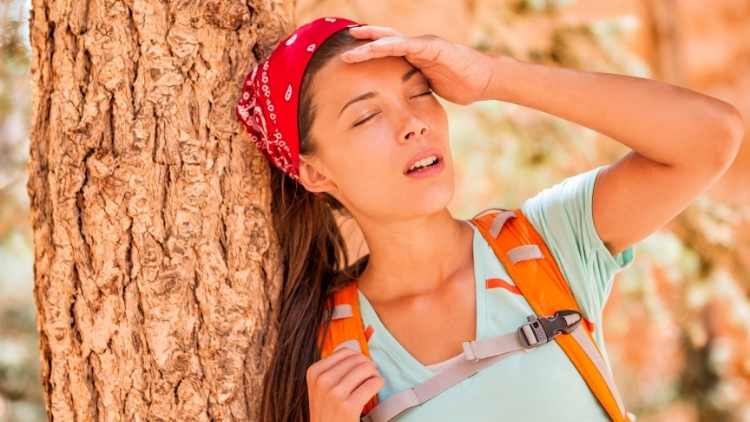
Tips for Staying Hydrated as a Keto Backpacker
To keep your body hydrated, you’ll want to drink enough fluids and ensure you have electrolytes with those fluids. Sodium is the most important electrolyte to replace. It helps your body absorb and retain water. Other important electrolytes are potassium, chloride, calcium, and magnesium. You can get electrolytes by adding a supplement to your water or by eating electrolyte-rich snacks throughout the day. See What to Eat and Drink While Hiking in Hot Weather for more hydration tips.
Keto-Friendly Electrolyte Drinks:
- Gatorade Zero
- LMNT Recharge
- Water with table salt
- Pedialyte Zero Sugar

Keto Backpacking: Eating Keto Smart – Tip #3
Don’t Forget the Fiber
The keto diet tends to be low in plant foods. What comes along with plant foods? Fiber! Fiber keeps your gut healthy and maintains normal bowel function. Cutting out plant foods like whole grains and fruits can cause constipation and other bowel issues. This can be disastrous on the trail. If you plan to be on the keto diet long-term, be sure to include sources of fiber. Nuts and seeds are great ways to add fiber to your diet. Just pay attention to the amounts, as many contain up to 8-10 grams of carbohydrates per ounce. Non-starchy veggies like dehydrated kale are also essential to include. Finally, you may want to consider a fiber supplement to fill the gaps.
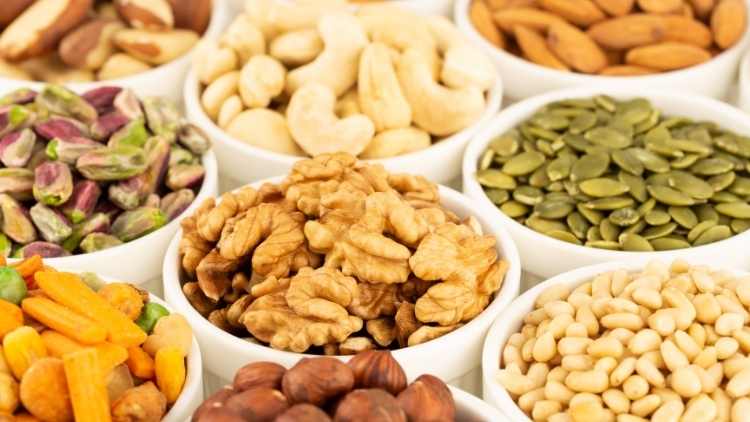
| Nuts & Seeds: (¼ cup serving size) | Total Carbs (g) | Fiber (g) |
| Almonds | 5 | 3 |
| Cashews | 9 | 2 |
| Macadamia nuts | 4 | 2 |
| Pecans | 14 | 10 |
| Walnuts | 11 | 5 |
| Peanuts | 5 | 2 |
| Sunflower seeds | 6 | 2 |
| Chia seeds | 12 | 10 |
Don’t just eat keto; eat keto smart!
We hope this post provided quick and easy tips on safely following the keto diet while backpacking. If you’re a fan of making DIY backpacking meals, try our Keto-Friendly Tuna Salad. It’s an ultralight, no-cook backpacking recipe that’s easy to prepare at home and even easier to prepare on the trail.
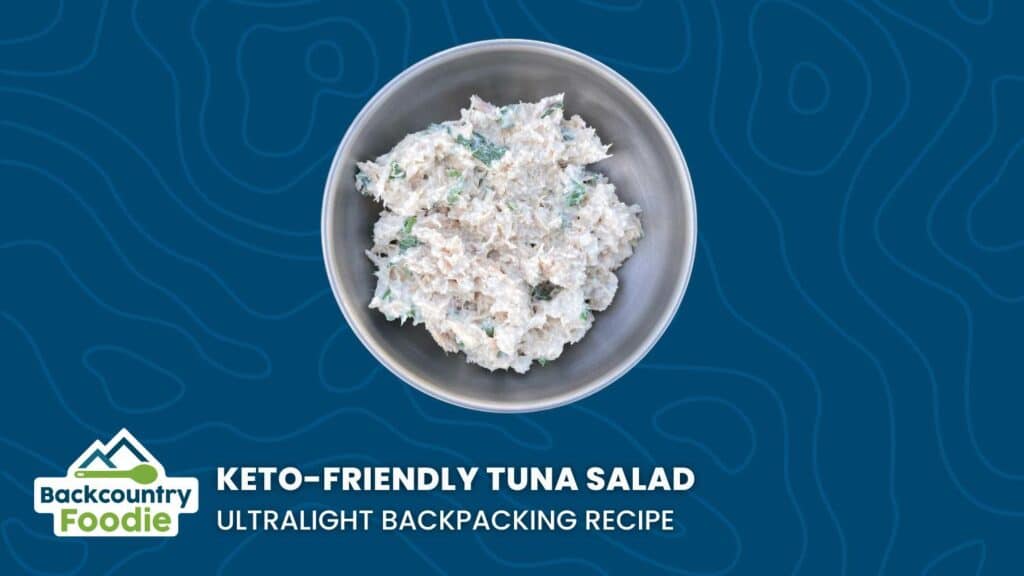
Did you enjoy this post?
Pin it and share it with your fellow hikers.
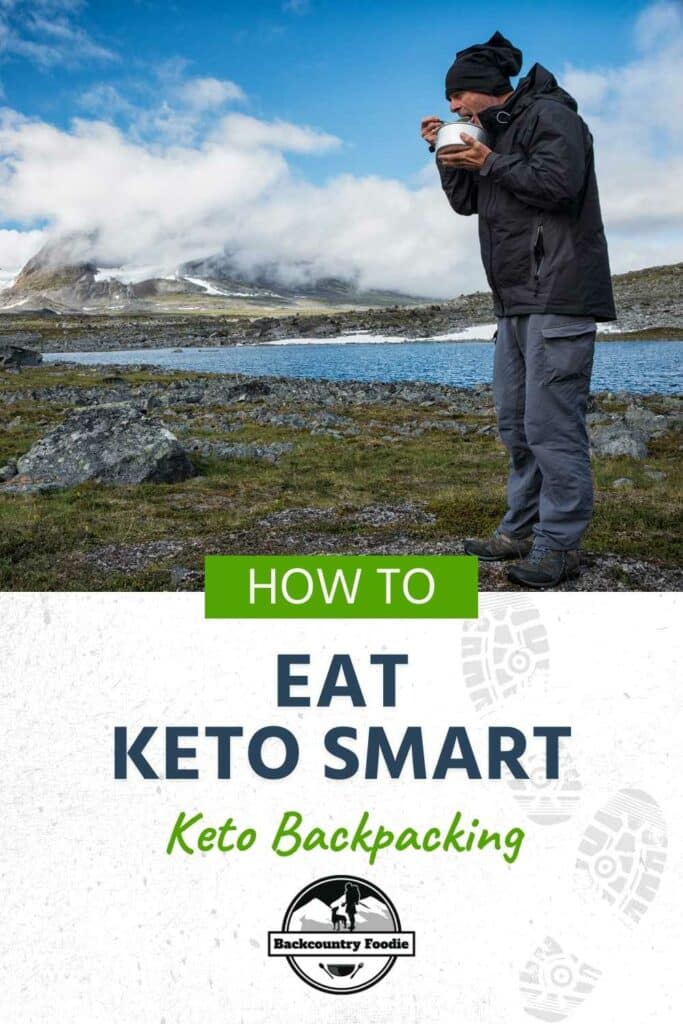
Are you new to our blog?
Consider checking out these posts:
- Backpacking on Keto & Hiking Performance
- Keto-Friendly Tuna Salad | Ultralight Backpacking Recipe
- How to Dehydrate Canned Tuna for Backpacking Meals
- Cold Soaking Guide for Stoveless Backpackers
- Backpacking Nutrition Tips for Recovery on the Trail
ABOUT THE AUTHORS:
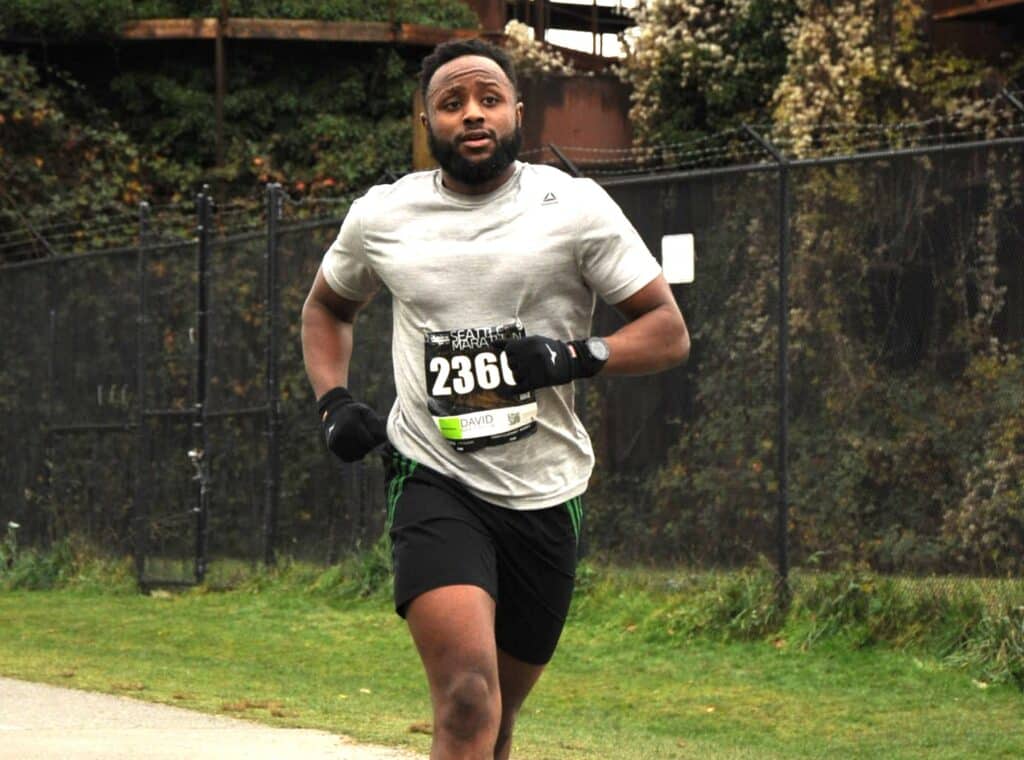
Davi Reid is a dietetic intern mentored by Aaron Owens Mayhew. He holds a Bachelor of Science degree in Nutrition & Dietetics. He’s also an avid culinary connoisseur and started cooking at age five. When he’s not around food, he’s training as a hybrid athlete who runs marathons and strength trains. His current hobby is photography, and he plans to run his own business one day.
Aaron Owens Mayhew, MS, RDN, CD, is a registered dietitian and ultralight long-distance backpacker with over 20 years of nutrition and backpacking experience. She’s also the founder and owner of Backcountry Foodie, an online ultralight recipes and meal planning platform for backpackers. She also enjoys teaching hikers about backpacking nutrition via virtual masterclasses, YouTube videos, and podcast episodes. You can follow Aaron’s adventures in the kitchen and the backcountry via Instagram and Facebook.
References
- Burke LM. Ketogenic low-CHO, high-fat diet: the future of elite endurance sport?. J Physiol. 2021;599(3):819-843. doi:10.1113/JP278928
- McSwiney FT, Doyle L, Plews DJ, Zinn C. Impact Of Ketogenic Diet On Athletes: Current Insights. Open Access J Sports Med. 2019;10:171-183. Published 2019 Nov 15. doi:10.2147/OAJSM.S180409
- Durkalec-Michalski K, Nowaczyk PM, Siedzik K. Effect of a four-week ketogenic diet on exercise metabolism in CrossFit-trained athletes. J Int Soc Sports Nutr. 2019;16(1):16. Published 2019 Apr 5. doi:10.1186/s12970-019-0284-9
- Cao J, Lei S, Wang X, Cheng S. The Effect of a Ketogenic Low-Carbohydrate, High-Fat Diet on Aerobic Capacity and Exercise Performance in Endurance Athletes: A Systematic Review and Meta-Analysis. Nutrients. 2021;13(8):2896. Published 2021 Aug 23. doi:10.3390/nu13082896
- Zajac A, Poprzecki S, Maszczyk A, Czuba M, Michalczyk M, Zydek G. The effects of a ketogenic diet on exercise metabolism and physical performance in off-road cyclists. Nutrients. 2014;6(7):2493-2508. Published 2014 Jun 27. doi:10.3390/nu6072493
- Burtscher M. Exercise Capacity for Mountaineering: How Much Is Necessary? Res Sports Med. 2004;12(4):241-250. doi:10.1080/15438620490497332

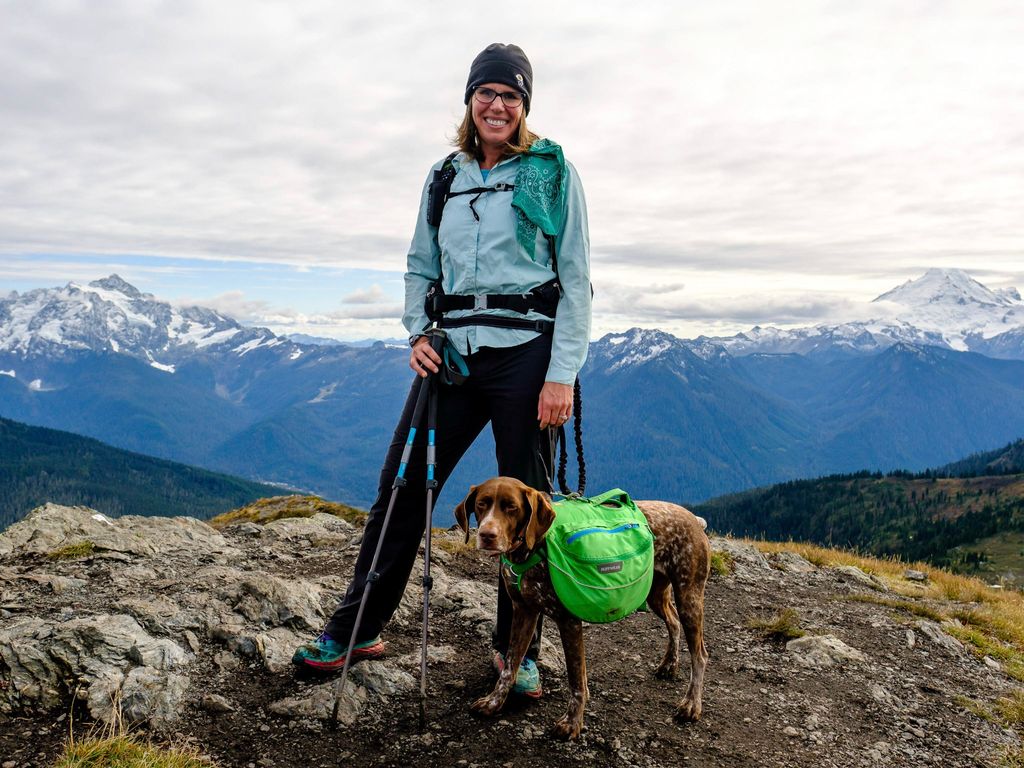
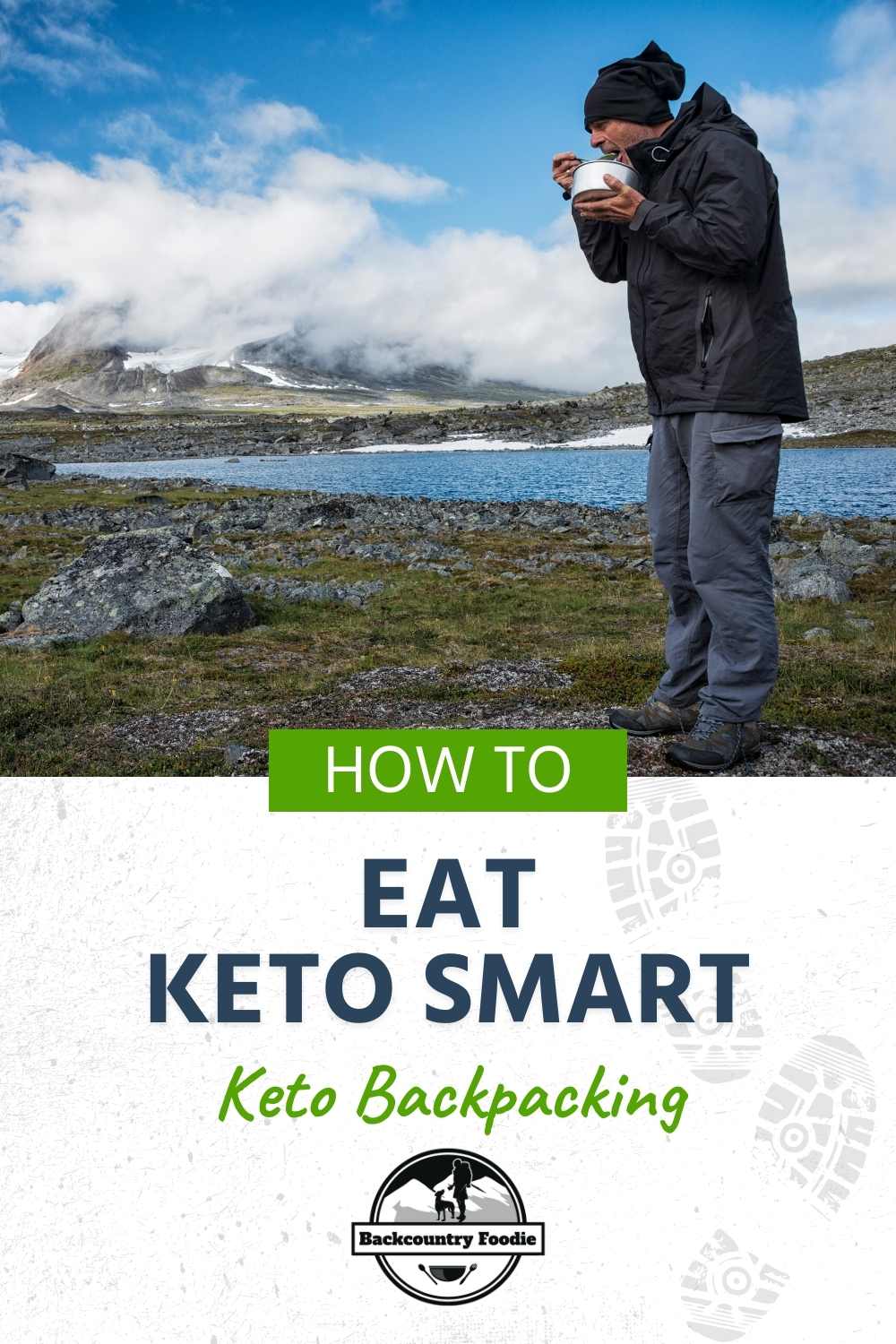
One Comment
I came across a ketovore book while at Shaw’s Hostel in Monson, ME this summer. It’s self-published and therefore may be harder to locate a copy, but here’s the info: Ausinheiler, Bryan. “Ketogenic Backpacking: How to Pack Lighter and Go Farther by Fueling with Fat.” (2018). Contains some of the theory and lots of recipes.